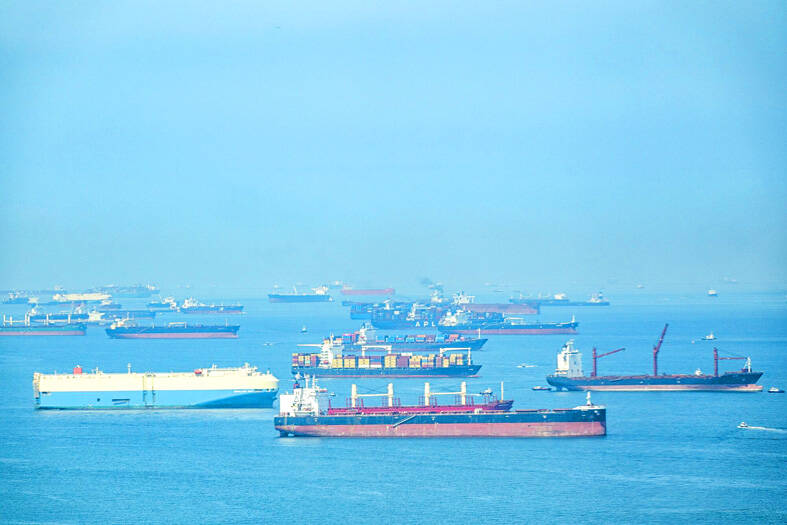Political tensions between the US and China are contributing to lower container shipments between the world’s two largest economies, on top of an already-underway reshaping of global trade, a major shipping industry executive said.
“We are seeing a deleveraging of trade between the US and China,” Ocean Network Express Holdings Ltd CEO Jeremy Nixon said at the Capital Link Singapore Maritime Forum.
“Many companies in the US are looking to reduce down the amount of imports they have got coming from China,” Nixon said.

Photo: Bloomberg
The share of boxes hauling everything from cell phones to tables arriving in the US from China has fallen by about 10 percentage points over the past year, said Nixon, whose company is among the top 10 container shippers.
As a result, the US is establishing stronger ties with other trade partners including Europe, a trend Nixon said is expected to continue.
The world’s two largest economies have been steadily becoming less reliant on one another for much of the past year. That has been driven primarily by a broad-based slowdown in the global economy, and it has been particularly acute for containers as the demand boom that took place during the COVID-19 pandemic has reversed.
The decoupling is now being exacerbated by geopolitics, Nixon said.
Tensions have flared over issues from Taiwan to the alleged spy balloon that was shot down over the US. Meanwhile, US President Joe Biden is seeking to sign an executive order that limits investment in key parts of China’s economy by US businesses.
The slowdown in the China-US route has led to the US importing more from elsewhere, Nixon said.
While container freight rates across the board have slumped this year, the decline has been less precipitous in Europe, as the US imports more from China, he said.
Shipping flows into the US from the Mediterranean, India and Southeast Asia have been bolstered.
Separately, global political frictions could cause turmoil in economic growth and inflation, European Central Bank Executive Board member Fabio Panetta said.
“Geopolitical shocks may trigger persistent output and inflation volatility, with multiple spillovers,” Panetta said in a speech yesterday, cautioning that so-called fragmentation could affect European monetary policy.
“Russia’s aggression against Ukraine has, for instance, disrupted energy and commodities markets, with major implications for inflation,” he said.
Geopolitical hotspots have been multiplying, whether the war in Ukraine or the potential for conflict around Taiwan. Central bankers are increasingly concerned about the knock-on effects of deglobalization, as many countries seek to implement costly environmental policies.

Semiconductor business between Taiwan and the US is a “win-win” model for both sides given the high level of complementarity, the government said yesterday responding to tariff threats from US President Donald Trump. Home to the world’s largest contract chipmaker, Taiwan Semiconductor Manufacturing Co (TSMC, 台積電), Taiwan is a key link in the global technology supply chain for companies such as Apple Inc and Nvidia Corp. Trump said on Monday he plans to impose tariffs on imported chips, pharmaceuticals and steel in an effort to get the producers to make them in the US. “Taiwan and the US semiconductor and other technology industries

A start-up in Mexico is trying to help get a handle on one coastal city’s plastic waste problem by converting it into gasoline, diesel and other fuels. With less than 10 percent of the world’s plastics being recycled, Petgas’ idea is that rather than letting discarded plastic become waste, it can become productive again as fuel. Petgas developed a machine in the port city of Boca del Rio that uses pyrolysis, a thermodynamic process that heats plastics in the absence of oxygen, breaking it down to produce gasoline, diesel, kerosene, paraffin and coke. Petgas chief technology officer Carlos Parraguirre Diaz said that in

SMALL AND EFFICIENT: The Chinese AI app’s initial success has spurred worries in the US that its tech giants’ massive AI spending needs re-evaluation, a market strategist said Chinese artificial intelligence (AI) start-up DeepSeek’s (深度求索) eponymous AI assistant rocketed to the top of Apple Inc’s iPhone download charts, stirring doubts in Silicon Valley about the strength of the US’ technological dominance. The app’s underlying AI model is widely seen as competitive with OpenAI and Meta Platforms Inc’s latest. Its claim that it cost much less to train and develop triggered share moves across Asia’s supply chain. Chinese tech firms linked to DeepSeek, such as Iflytek Co (科大訊飛), surged yesterday, while chipmaking tool makers like Advantest Corp slumped on the potential threat to demand for Nvidia Corp’s AI accelerators. US stock

SUBSIDIES: The nominee for commerce secretary indicated the Trump administration wants to put its stamp on the plan, but not unravel it entirely US President Donald Trump’s pick to lead the agency in charge of a US$52 billion semiconductor subsidy program declined to give it unqualified support, raising questions about the disbursement of funds to companies like Intel Corp and Taiwan Semiconductor Manufacturing Co (台積電). “I can’t say that I can honor something I haven’t read,” Howard Lutnick, Trump’s nominee for commerce secretary, said of the binding CHIPS and Science Act awards in a confirmation hearing on Wednesday. “To the extent monies have been disbursed, I would commit to rigorously enforcing documents that have been signed by those companies to make sure we get